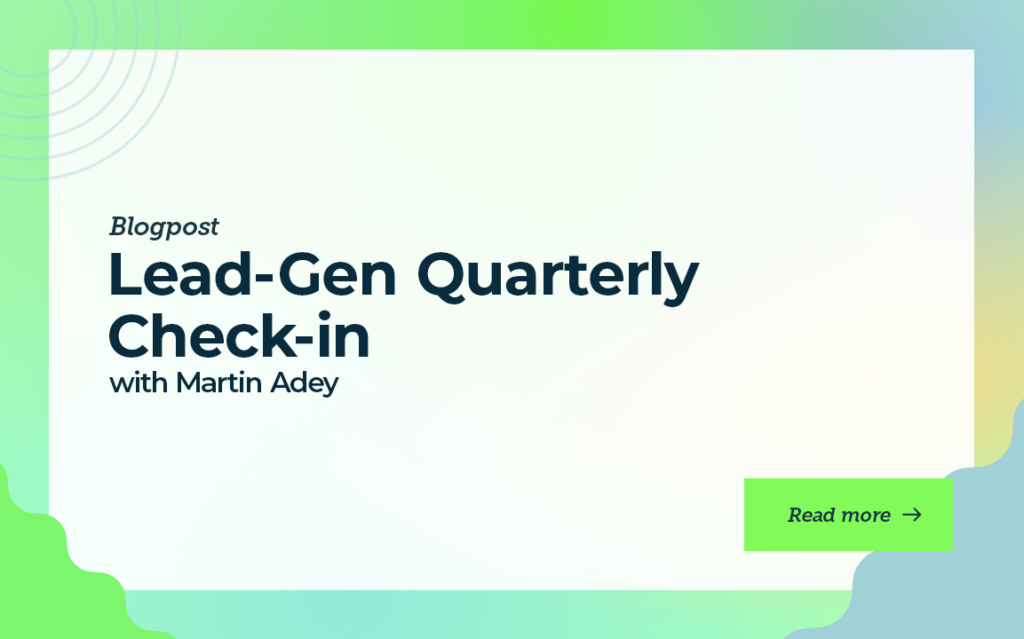Lead-Gen Quarterly Check-in with Martin Adey

Martin Adey, the founder of Leadosaurus, recently joined the Predictable Revenue Podcast to discuss a pivotal transition in his entrepreneurial journey: moving from being deeply involved in daily operations to stepping back and allowing his business to thrive independently.
As he puts it, he’s on the verge of achieving the “Holy Grail” of working on the business instead of in it. But with this shift comes a mix of excitement and uncertainty.
Embracing the Shift from Practitioner to Strategist
Martin opens up about running Leadosaurus on the EOS framework from the book “Traction.” He’s learning to trust his team and step back, but it’s not easy. Entrepreneurs often struggle with guilt and the fear of losing touch with their business. As Martin puts it, “I feel tremendous guilt when I’m not just pounding my head against the desk… there’s still this sense of just looming dread.”
The Struggle of Letting Go
Letting go is tough, especially for founders who’ve been deeply involved in every detail. Martin compares it to being in the trunk of a moving car, knowing the business is moving forward but without a clear view of the road. This captures the anxiety of shifting from a hands-on role to a strategic one.
This change isn’t just about delegating tasks; it’s about redefining your role, finding new ways to add value, and managing the emotional challenges of stepping back. It’s an ongoing balance of trusting your team while resisting the urge to dive back into the details.
Key Takeaways:
- Transitioning from hands-on to strategic roles is a common but tough step for entrepreneurs.
- It requires letting go of control and redefining your purpose in the business.
- Feelings of guilt and anxiety are normal; staying connected, like “walking the shop floor” digitally, can help ease the shift.
Navigating the Shift Without Detachment
Founders stepping back often struggle to balance elevated roles with staying connected to daily operations. Collin initially made the mistake of abdicating rather than delegating, leading to setbacks. His mentor stressed the importance of staying engaged, even in a strategic role.
Martin echoes this, noting that detachment can cause costly errors, like scaling too fast without oversight. He now balances stepping back while staying tuned to his business’s pulse.
Key Insights:
- Elevating your role doesn’t mean detaching; find new ways to stay engaged.
- Regular customer interviews help maintain market awareness and adapt to evolving needs.
- Shifting focus to long-term risks requires proactive efforts to stay connected and strategic.
Riding the Waves of Cold Email and Deliverability Challenges
For founders in cold email and lead generation, fluctuating deliverability rates can feel like navigating a minefield. Martin voiced concerns about rising noise in his inbox and wondered if declining deliverability and reply rates signal deeper issues. Collin reminded him that these fluctuations are often random, and one experience doesn’t reflect broader trends.
Key Points to Consider:
- Temporary Fluctuations Are Normal: Expect natural ups and downs due to factors like spam filter updates or seasonality. These dips are part of the landscape, not signs of doom.
- Quality Over Quantity: High-quality, targeted cold emails remain effective. Mass, untargeted blasts are less likely to succeed, but messages that truly resonate will still work.
- Adapt to Changes: The cold email game will evolve, but adaptability is key. Noticing more poorly executed emails? It’s a sign to stand out by refining your approach.
Collin highlighted that sales development still drives around 30% of revenue in SaaS companies, underscoring the ongoing importance of cold email. The industry’s ups and downs aren’t unique to one company; they’re a shared challenge. Instead of abandoning cold email, it’s time to sharpen your tools and focus on delivering value through quality outreach.
Navigating Growth Decisions in Lead Generation
Martin’s reflections highlight a key challenge for founders: balancing the urge to diversify with staying true to core strengths. He’s contemplating expanding beyond cold email, his company’s specialty, into channels like LinkedIn, direct mail, or higher-touch strategies. This isn’t just about new tools; it’s an identity shift that could redefine his business.
Collin shares a cautionary tale from his 2018 pivot. Frustrated with cold email results, he moved to cold calling without rigorous analysis, driven more by gut than data. The lesson? Major business shifts should be strategic, not reactive to short-term frustrations or market noise.
Martin’s dilemma, whether to evolve or double down, mirrors a broader entrepreneurial challenge: aligning any expansion with the company’s core mission and strengths. Diversification could risk an identity crisis if not carefully aligned with what sets the business apart.
Both founders also discuss the psychological hurdles of leading from afar. Martin’s discomfort echoes Collin’s past anxieties about stepping back from operations. This detachment can lead to second-guessing decisions, underscoring the need for clear, data-driven strategies over reactive shifts based on perceived market changes.
Decision-Making and Leadership in Uncertain Times
Decision-making for founders is rarely straightforward, especially with high stakes. Collin emphasizes the need for structured decision-making to avoid impulsive reactions based on gut feelings or isolated data points. He stresses having a thorough process: asking the right questions, considering all angles, and being aware of biases that can cloud judgment.
For those stepping back from daily operations, staying connected and informed is crucial. Collin’s “trunk of the car” analogy captures the detachment many founders feel.
The key?
Stay engaged through relevant metrics, dashboards, and consistent customer interactions while recognizing when personal stressors might skew your perspective.
Martin’s concerns highlight a common struggle: balancing the urge to act quickly with the need to pause and evaluate. Collin advises against rushing decisions based on fear or isolated stats; instead, assess whether your current strategy aligns with your long-term goals and adapt thoughtfully.
Ultimately, effective leadership isn’t just about making the right call, it’s about having the discipline to trust your team, the process, and your own ability to guide the business through uncertainty. Growth often means stepping back, reassessing, and refining, rather than just pushing forward blindly.
Conclusion
Stepping back from day-to-day operations is a pivotal yet challenging transition for founders. Martin and Collin’s experiences underscore the importance of redefining one’s role without losing touch with one’s business’s core.
For Martin, this means grappling with anxiety and guilt, which is typical for entrepreneurs who used to be deeply involved.
The key takeaway is the importance of structured decision-making over gut reactions. Collin emphasizes the need for a clear process to evaluate decisions rather than making impulsive changes based on short-term data. It’s about staying connected through metrics, customer interactions, and regular check-ins, ensuring you maintain a strategic view while trusting your team to handle the operational details.
Unlock the potential of your lead generation with Leadosaurus, where strategy meets scale!
Ready to transform your sales game? Dive into the Predictable Revenue podcast and services to boost your growth strategy.
NO TIME TO READ?
Listen On:



